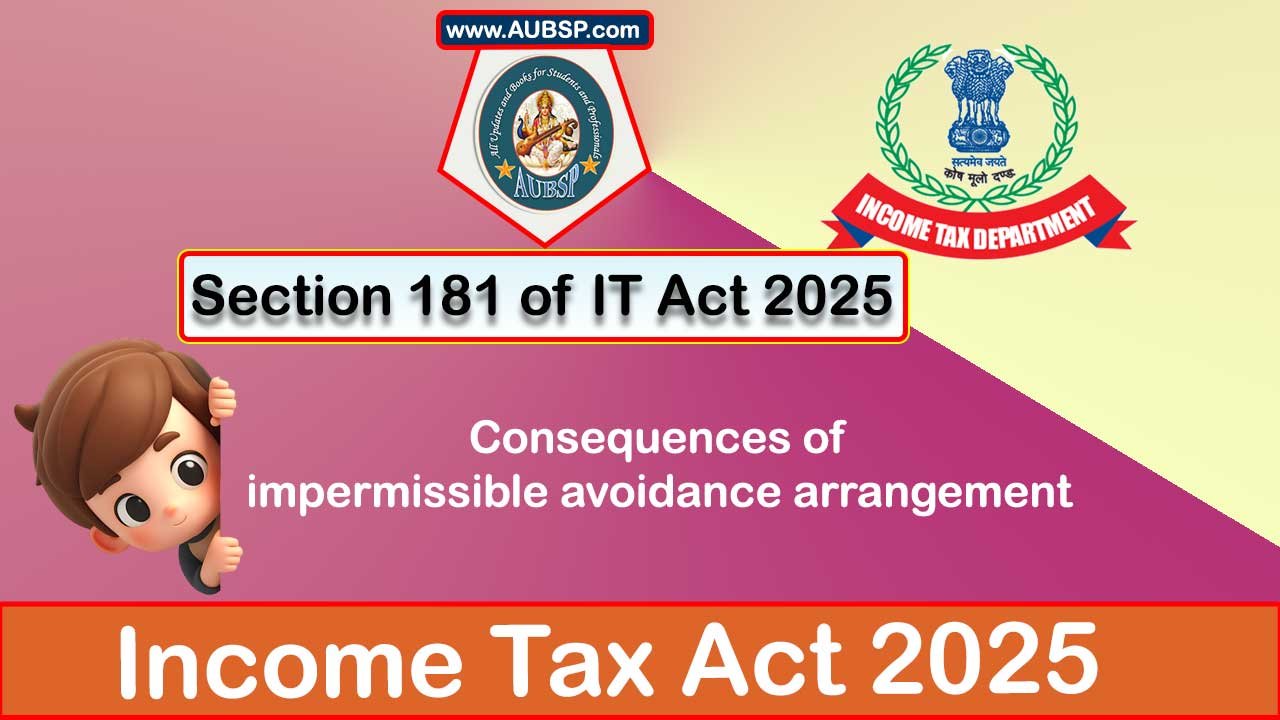Consequences of impermissible avoidance arrangement
[Section-181 as per the Income Tax Act, 2025 (this Act) w.e.f. 1st April, 2026.]
Section 181(1) of Income Tax Act 2025
181(1) If an arrangement is declared to be an impermissible avoidance arrangement, then, the consequences, in relation to tax, of the arrangement, including denial of tax benefit or a benefit under a tax treaty, shall be determined, in the manner as deemed appropriate.
Section 181(2) of Income Tax Act 2025
181(2) The consequences of an arrangement declared to be an impermissible avoidance arrangement as referred to in sub-section (1) shall include but shall not be limited to the following:—
- 181(2)(a) disregarding, combining or recharacterising any step in, or a part or whole of, the impermissible avoidance arrangement;
- 181(2)(b) treating the impermissible avoidance arrangement as if it had not been entered into or carried out;
- 181(2)(c) disregarding any accommodating party or treating any accommodating party and any other party as one and the same person;
- 181(2)(d) deeming persons who are connected persons in relation to each other to be one and the same person for the purposes of determining tax treatment of any amount;
- 181(2)(e) reallocating amongst the parties to the arrangement—
- (i) any accrual, or receipt, of a capital nature or revenue nature; or
- (ii) any expenditure, deduction, relief or rebate;
- 181(2)(f) treating—
- (i) the place of residence of any party to the arrangement; or
- (ii) the situs of an asset or of a transaction,
- at a place other than the place of residence, location of the asset or location of the transaction as provided under the arrangement; or
- 181(2)(g) considering or looking through any arrangement by disregarding any corporate structure.
Section 181(3) of Income Tax Act 2025
181(3) In this section,—
- (a)any equity may be treated as debt or vice versa;
- (b)any accrual, or receipt, of a capital nature may be treated as of revenue nature or vice versa; or
- (c)any expenditure, deduction, relief or rebate may be recharacterised.
FAQs on Section 181 of Income Tax Act 2025
What happens if an arrangement is declared to be an impermissible avoidance arrangement under the Income Tax Act, 2025?
If an arrangement is declared impermissible, tax consequences such as denial of tax benefits or treaty benefits will be determined in a manner deemed appropriate.
What types of actions can tax authorities take against an impermissible avoidance arrangement?
They can disregard, combine, or recharacterise any part of the arrangement, treat the arrangement as if it never existed, and take several other corrective actions outlined under Section 181(2).
Can the tax authorities ignore steps or parties involved in an impermissible avoidance arrangement?
Yes, they can disregard specific steps, parties (accommodating parties), or even treat connected persons as the same entity for tax purposes.
Are tax authorities allowed to reallocate income or deductions under such arrangements?
Yes, they can reallocate any accruals, receipts, expenditures, deductions, reliefs, or rebates among the involved parties.
Can the place of residence or location of assets/transactions be altered by tax authorities?
Yes, authorities may treat the residence of parties or situs of assets/transactions differently than as mentioned in the arrangement.
Can the corporate structure be ignored by tax authorities in such cases?
Yes, tax authorities can look through corporate structures and disregard them when evaluating impermissible arrangements.
Can equity be treated as debt under the Act?
Yes, equity can be treated as debt and vice versa under Section 181(3)(a).
Can capital and revenue nature items be interchanged for tax purposes?
Yes, receipts or accruals of capital nature may be treated as revenue and vice versa under Section 181(3)(b).
Are deductions or rebates subject to recharacterisation under this provision?
Yes, any expenditure, deduction, relief, or rebate may be recharacterised under Section 181(3)(c).


